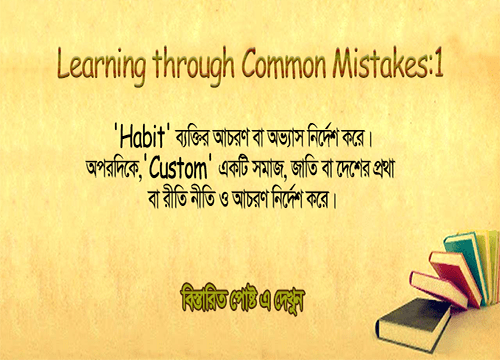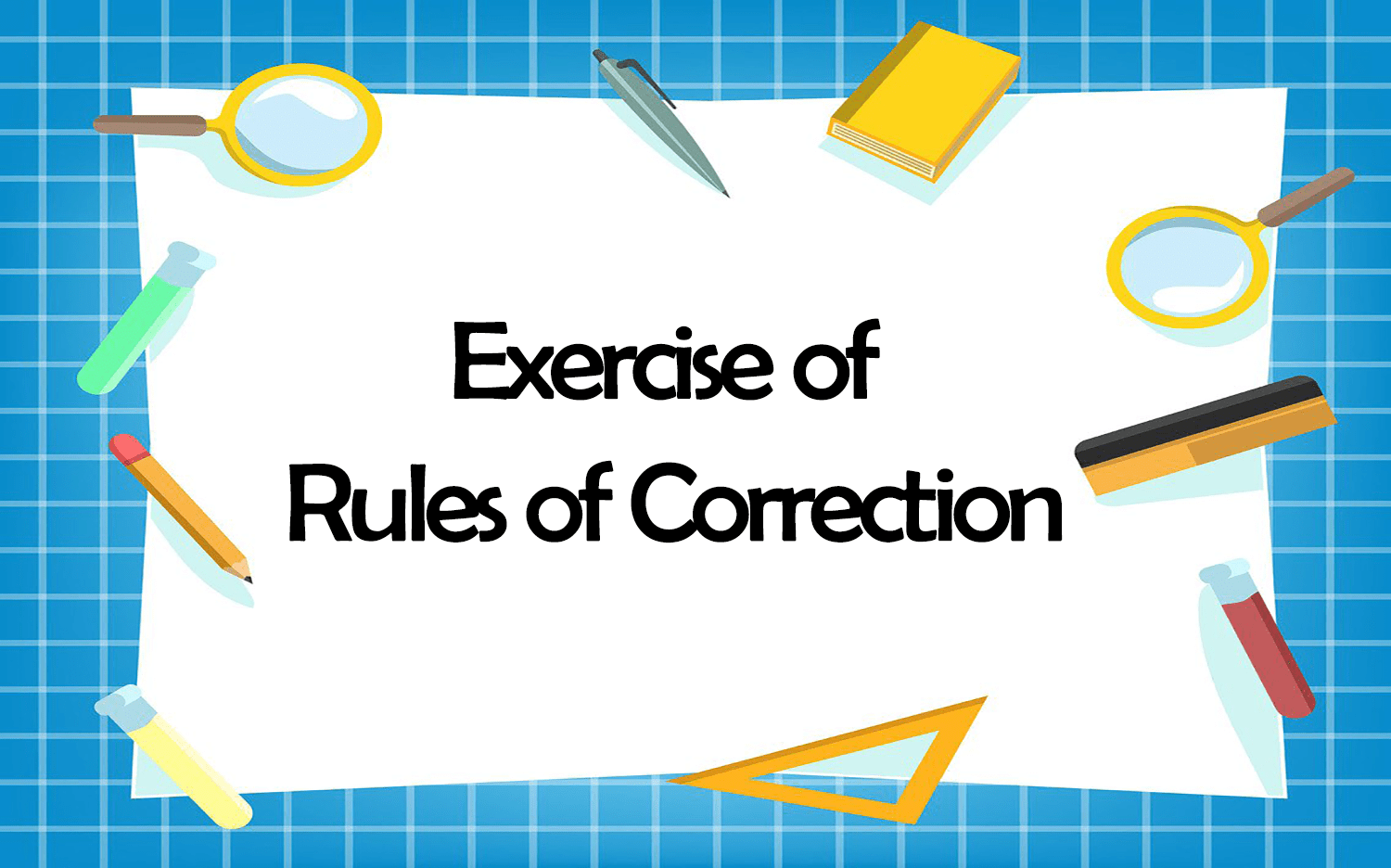by | Jul 27, 2020 | Admission Test, Grammar
➤Difference between Badly and Hardly
☞উপরের শব্দদুটির অর্থ বুঝতে বেশিরভাগ মানুষ ই ভুল করি। আমরা মনে করি Badly অর্থ খারাপভাবে আর Hardly অর্থ কঠিনভাবে। আসলে এই শব্দগুলোর অর্থ কিন্তু তা নয়।
➤Bad শব্দের অর্থ আমরা জানি, ‘খারাপ’। এটি মূলত adjective। কিন্তু, badly শব্দের অর্থ হলো, তীব্রভাবে/ খুব/ জরুরী। উদাহরণ হিসেবে বলা যায়,
He badly needs medical treatment (তার জরুরী ভিত্তিতে চিকিৎসা প্রয়োজন)
I badly need a pen (আমার একটি কলম খুব দরকার)।
➤ঠিক তেমনিভাবে Hard শব্দের অর্থ ‘কঠিন/ শক্ত’। কিন্তু hardly শব্দের অর্থ ‘কদাচিৎ/ সচারচর না/ না বললেও চলে’। উদাহরণ দিলে বিষয়টি পরিষ্কার হবে।
We hardly meet. অর্থ- আমরা কদাচিৎ দেখাসাক্ষাৎ করি অর্থাৎ সাক্ষাৎ করিনা বললেও চলে।
He hardly calls me. (সে আমাকে কালেভদ্রে ফোন করে অর্থাৎ ফোন করেনা বললেও চলে)।
আশা করছি আপনাদের নতুন কিছু জানাতে পেরেছি। কোন প্রশ্ন থাকলে নিচে মন্তব্য করুন।
ধন্যবাদ🙂🙂
Posted by:Mehedi Sagor
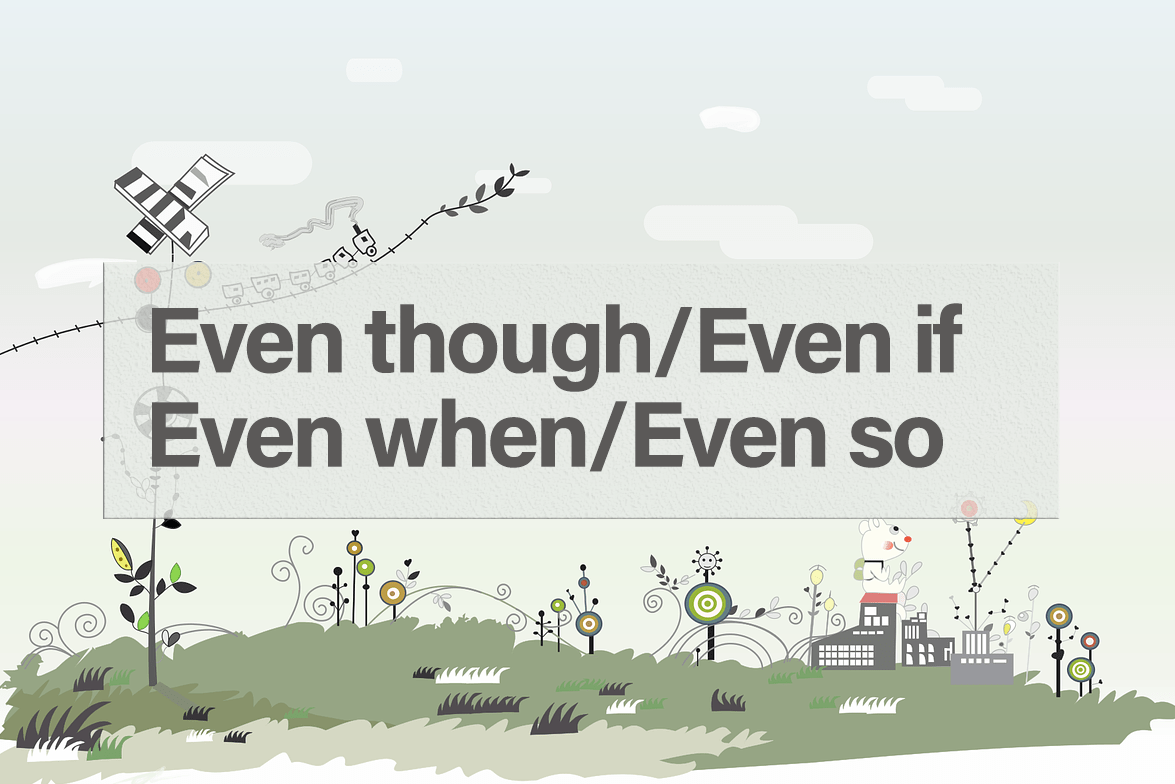
by Grammar World | Jul 22, 2020 | Admission Test, Grammar, IELTS
➤Even though/Even if/Even when/Even so -এদের অর্থ একই রকম (যদিও/তবুও) হলেও ব্যবহারে ভিন্ন!
✪চলুন, সহজে বুঝি এবং মনে থাকবে এমনভাবে খুবই সহজ কোনো ব্যাখ্যা দেখি-
★Even অর্থ -এমনকি,
Though -যদিও ….. [অতীত-বর্তমানের সাহায্যকারী ],
if-যদি……. ………… [বর্তমান-ভবিষ্যতের সাহায্যকারী],
When-যেখানে. ….. [অতীত,বর্তমান অথবা ভবিষ্যতের সাহায্যকারী],
এবং So -সুতরাং…. [একটা গল্প/বাক্যের ফলাফল প্রকাশে সাহায্যকারী]!
★Even তার পরের শব্দগুলোকে তাদের অর্থ প্রকাশে জোর দেয়!
✰Even though:অতীতে একটা কাজে সফল বা ব্যার্থ হলেন কিন্তু তখন বা এখন তার বিপরীত ফল পেলেন বা যথেষ্ট না!
☞Even though he/she shared your post,it didn’t approved.
✰Even if: এখন বা ভবিষ্যতে একটা কাজের সফল বা ব্যার্থ হলেন কিন্তু তারপরও পরের ফলাফল বিপরীত বা যথেষ্ট না!
☞Even if this post will approve, won’t get more reaction or comment.
✰Even when: একটা কাজ করছেন কিন্তু ফলাফল তার বিপরীত!
☞Even when he is practicing salah ,thinking how to be a romantic model like SRK.
✰Even so: একটা গল্প/বাক্যের ফলাফল দ্বারা ইতি টানলেন যা তার পূর্বের আলোচনার বিপরীত/সাংঘর্ষিক !
☞There are billion of haters even so Dr Zakir Naik still practicing/performing on his way.
আমাদের এই পোস্টটি আপনার কাছে ভালো লাগলে পোস্টটি শেয়ার করে অন্যদেরও শেখার সুযোগ করে দিন।
Posted by Tanim Hasan
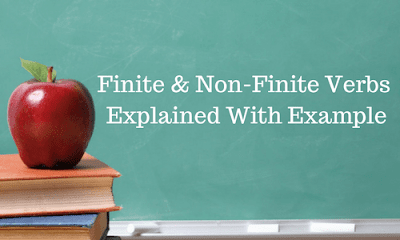
by Grammar World | Jul 18, 2020 | Admission Test, Grammar
➤Finite Verb & Non-Finite Verb.
বাক্যের গুরুত্বপূর্ণ অংশ Verb যার প্রকারভেদের পরিধি অনেক এবং সব-প্রকার গঠিত যে দুই প্রকার
(Finite Verb & Non-Finite Verb) থেকে তা নিয়েই আজকের চেষ্টা!
✪বুঝার সুবিধার্থে Finite Verb (সমাপিকা ক্রিয়া)-কে নিব সহজ-সরল Verb এবং Non-Finite Verb (অসমাপিকা ক্রিয়া)-কে গাঢ়-ত্যাড়া Verb হিসেবে!
✰Finite Verb: V1, V2, Auxiliary+V(যেকোনো Verb).
✰Non-Finite Verb: to+ V1 (Infinitive), Auxiliary(নাই)+V3/Ving.
★সহজ-সরল-রা (Finite Verb) নিয়ম মেনে সোজা পথে চলে। যেমন-
*V1,V2 অথবা Auxiliary + Verb (Verb এর যেকোনো Form)!
★গাঢ়-ত্যাড়া-রা (Non-Finite Verb) শুধুই তাদের মতন করে চলে। যেমন-
* Auxiliary না থাকতেই Ving বসে (Continuous Tense)!
*Auxiliary ছাড়াই V3 বসে ( Perfect Tense)
*to+V1 (to বসে Verb-কে V1 না থাকলেও V1 বানায় এবং Ving হলে ing- কে Remove করে দেয়!)
☞I “was watched” (Finite) a video on this topic from Grammar World.
☞We “have” (Finite) “to know” (Non-Finite) English well for our career.
Posted by Tanim Hasan
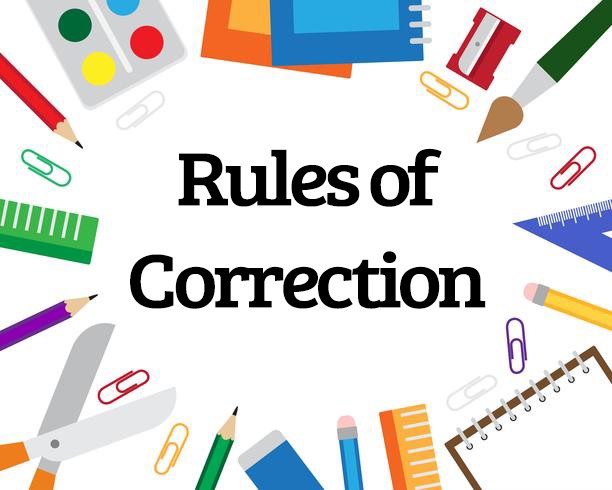
by Grammar World | Jul 9, 2020 | Admission Test
Rule:1-
কাজ অর্থে Work শব্দটি plural হয় না। plural form works বুঝায় কোন লেখকের লেখাকে।
Inc: I have many works to do.
Cor: I have a lot of work to do
Inc: The work of Nazrul Islam are many
Cor: The works of Nazrul Islam are many
Rule-2
All শব্দটি everything বুঝালে Verb singular হয়। অন্যদিকে all hw` everybody বুঝায় তবে Verb plural হয়।
Inc: All are lost, nothing is left
Cor: All is lost , nothing is left
Inc: All of us is present
Cor: All of us are present
Rule-3
একাধিক যে কোন কিছু বুঝাতে এমন কি দুইয়ের কম হলেও noun অবশ্যই Plural ব্যবহার করতে হবে।
Inc: I read it in one and a half hour
Cor: I read it in one and a half hours
Rule-04
No এবং No
No অর্থ হচ্ছে not any ইহা adjective হিসেবে noun কে qulify করে। কিন্তু noun যদি অন্য adjective যেমন- any, much, enough. ইত্যাদি দ্বারা modified হয়ে থাকে তবে on এর পরিবর্তে adverb not ব্যবহার করতে হয়।
যেমন-
Inc: I have no any mistakes in diction
Cor: I have not any mistakes in diction
Inc: I have not mistakes in diction
Cor: I have no mistakes in dietion
Note: mistakes এখানে noun তাই no adverb দিয়ে modify করা ভুল হয়েছে।
উল্লেখ্য যে- No adverb হিসেবে একমাত্র comparative form এর আগে বসতে পারে। যেমন- I have no more to say.
Rule-05
Others একটি Pronoun adjective নয়। তাই কখনো noun এর সামনে বসে noun কে modify করতে পারে না। আর other হচ্ছে একটি adjective তাই ইহা noun এর সামনে বসে noun কে modify করতে পারে। যেমন-
Inc: The others student (Noun) are not present
Cor: The other students are not present
Rule-06
its হচ্ছে একটি possessive adjective তাই ইহা noun কে modify করে। অপরদিকে it’s হচ্চে it’s এর সংক্ষিপ্তরূপ। যেমন-
Inc: The baby is crying for it’s mother
Cor: The baby is crying for its mother
Inc: Its raining cats and dogs
Cor: It’s raining cats and dogs
Rule-07
Later and latter
Later সময় refer করে আর latter শব্দটি বুঝায় দুটির দ্বিতীয়টি। যেমন-
Inc: Chittagong and Dhaka are large cities the later has a population of over a core.
Cor: Chittagong and Dhaka are large cities
Inc: She came to school latter than I
Cor: She came to school later than I
Rule-08
Less and Fewer
Less শব্দটি amount, quanity, value ইত্যাদির পূর্বে অর্থাৎ Uncountable noun এর পূর্বে বসে। Fewer number শব্দটি কে ইংগিত করে অর্থাৎ ইহা সর্বদাই countable noun এর পূর্বে বসে।
যেমন-
Inc: They have less books than I have
Cor: They have fewer books than I have
Rule-09
Each and every
Each শব্দটি বেশি individual এবংspecific ইহা সাধারণত দুটি বা ততোধিক হতে প্রত্যেককে one by one বুঝাতে ব্যবহৃত হয়। আর every কখনো দুটি থেকে একটি পৃথক করে বুঝাতে ব্যবহৃত হয়না বরং দুয়ের অধিকের ক্ষেত্রে ব্যবহৃত হয়।
যেমন-
Inc: Every one of the two boys was wrong
Cor: Each one of the two boys was wrong
উল্লেখ্যঃ Every শুধু adjective তাই pronoun হিসেবে ( every+of+ noun/ pronoun) every এর ব্যবহার incorrect অপরদিকে each হচ্ছে একই সাথে adjective ও pronoun তাই Each + nounI Each +of +noun/pronoun এ দুই structure correct
যেমন-
Every boy was honest . Each boy was honest কিন্তু Every of them was present বলা যাবে না। বলতে হবে Each of them was present.
Rule-10
Hard and hardly
Hard একটি adverb of manner যার অর্থ হচ্ছে severely আর Hardly একটি adverb of frequency যার অর্থ হচ্ছে not quite বা scarcely ইহা সর্বদাই একটি না বোধক অর্থ দেয়।
Inc: He tried hardly to be a student of DU.
Cor: He tried hard to be a student of DU,
Inc: The hardly do not come to our house
Cor: They hardly come to our house
Rule-11
Verb and too
Verb শব্দটি adjective বা adverb কে stronger করার জন্য ব্যবহৃত হয়। verb এর জায়গায় too ব্যবহার করা যায় না। আর Too অর্থ হচ্ছে more than enough or so much যার কারণে আরো কিছু একটা ঘটে। যেমন- It is very hot in summer বললে বাক্যটি এখানেই complete হয়ে যায়।কিন্তু very এর জায়গায় too ব্যবহার করলে incomplete থেকে যাবে। কেননা তখন প্রশ্ন হয়- Too hot for waht? তাই বাক্যটি Complete করার জন্য বলতে হবে too hot to play cricket এখানেও too এর জায়গায় very ব্যবহার করা যাবে না।
Inc: It is too cold in the winter
Cor: It is very cold in the winter
Inc: It is now very hot to play cricket
Cor: It is now too hot to play cricket
Rule-12
Since and for
for ঐ সব phrase এর আগে বসে যা একটি period of time কে বুঝায়। আর since বসে point of time এর আগে।
I have been living here since 10 years এ বাক্য 10 years একটি period of time তাই since এর ব্যবহার incorrect বলতে হবে I have been living here of 10 years
Inc: I have been living her for 1999 (1999 একটি point of time)
Cor: I have been living her since 1999
Rule: 13
never, seldom, rarely, neither, nor, no, sooner, ইত্যাদি যখন কোন complete clause এর আগে তখন টি verb অবশ্যই subject এর আগে চলে আসে।
যেমন-
Inc: Never I have heard of such a thing
Cor: Never have I heard of such a thing
Rule-14
Let এর পর infinitive এর to ইহা থাকে যেমন-
Inc: His father would not let him to go
Cor: His father would not let him go.
Rule-15
any- either
Either বুজায় one or the other of the two আর any বুঝায় one of the three or more তাই দুটির ক্ষেত্রে any এবং দুইয়ের অধিকের ক্ষেত্রে either ব্যবহার করা ভুল হবে।
যেমন-
Inc: Any of these two books is good
Cor: Either of these two books is good
Inc: Either of these three books will do
Cor: Any of these three books will do
Rule-16
দুটির বা দুজনের কেউই করেনি—এমনটি বুঝাতে এর পরিবর্তে Neither বসে।
যেমন-
Inc: Both of them did not go to school
Cor: Neither of them went to school
Inc: Both of my parents did not tell a lie
Cor: Neither of my parents told a lie
+ কতিপয় Intransitive Verb রয়েছে যেগুলোর হয় না। যথা-
| die |
appear |
seem |
disappear |
| happen |
belong |
allude |
occur |
| ensure |
result |
comprise |
perish |
| refer |
issue |
indulge |
wonder |
Incorrect: It was appeared
Correct: It appeared



